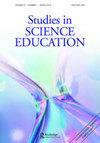气候变化教育:脱离纪律的问题
IF 9.9
2区 教育学
Q1 EDUCATION & EDUCATIONAL RESEARCH
引用次数: 7
摘要
摘要全球气候变化(CC)在学校课程中几乎没有涉及,学校毕业生大多没有受过气候变化方面的教育。本文的目的是提出将CC概念化为一门学科的理由,并进一步论证为什么CC应该作为一门学科纳入学校课程。对CC在全球课程中的初步研究表明,将CC纳入课程的主要方法是跨课程方法。针对CC知识体系的完整性以及教学带来的挑战,讨论了与这种方法相关的问题。本文继续构建一个案例,将CC概念化为一门学科。它解释了学科、学科和学科的概念。此外,它还描述了CC的学科特征,以及将CC作为一门学科纳入课程的好处。然而,课程阻力问题被发现并进行了讨论。这些阻力是通过考虑来自课程理论、认知心理学和科学哲学的证据来解决的,这些证据支持纳入CC学科。最后,讨论了建立CC学科所面临的挑战。论文最后考虑了对进一步研究的启示。本文章由计算机程序翻译,如有差异,请以英文原文为准。
Climate change education: the problem with walking away from disciplines
ABSTRACT Globally climate change (CC) is scarcely addressed in school curricula, and school graduates are mostly uneducated about climate change. The purpose of this paper is to make a case for conceptualising CC as a discipline, and to further argue why CC should be included in school curricula as a disciplinary-subject. An initial examination of CC in curricula globally reveals that the main approach for including CC in the curriculum is the cross-curriculum approach. The problems associated with this approach are discussed in regard to the challenges posed to the integrity of the CC body of knowledge, and to the teaching and learning. The paper continues to build a case for conceptualising CC as a discipline in its own right. It explains the notions of: disciplines, subjects, and disciplinary-subjects. Further, it describes the disciplinary characteristics of CC, and the benefits of including CC in the curriculum as a disciplinary-subject. However, curricular resistance issues are identified and discussed. These resistances are addressed by considering evidence derived from curriculum theory, cognitive psychology and philosophy of science for supporting the inclusion of a CC disciplinary-subject. Finally, the challenges in establishing a CC disciplinary-subject are discussed. The paper concludes by considering implications for further research.
求助全文
通过发布文献求助,成功后即可免费获取论文全文。
去求助
来源期刊

Studies in Science Education
EDUCATION, SCIENTIFIC DISCIPLINES-
CiteScore
15.30
自引率
2.00%
发文量
7
审稿时长
>12 weeks
期刊介绍:
The central aim of Studies in Science Education is to publish review articles of the highest quality which provide analytical syntheses of research into key topics and issues in science education. In addressing this aim, the Editor and Editorial Advisory Board, are guided by a commitment to:
maintaining and developing the highest standards of scholarship associated with the journal;
publishing articles from as wide a range of authors as possible, in relation both to professional background and country of origin;
publishing articles which serve both to consolidate and reflect upon existing fields of study and to promote new areas for research activity.
Studies in Science Education will be of interest to all those involved in science education including: science education researchers, doctoral and masters students; science teachers at elementary, high school and university levels; science education policy makers; science education curriculum developers and text book writers.
Articles featured in Studies in Science Education have been made available either following invitation from the Editor or through potential contributors offering pieces. Given the substantial nature of the review articles, the Editor is willing to give informal feedback on the suitability of proposals though all contributions, whether invited or not, are subject to full peer review. A limited number of books of special interest and concern to those involved in science education are normally reviewed in each volume.
 求助内容:
求助内容: 应助结果提醒方式:
应助结果提醒方式:


